I Wake Up Streaming: March 2021
Movies
In this edition of “I Wake Up Streaming,” novelist William Boyle rounds up his top streaming picks for the month of March. The column’s name is a play on the 1941 film I Wake Up Screaming, starring Betty Grable, Victor Mature, and Carole Landis. While the film’s title hits a pleasing note of terror and despair, changing that one letter speaks to the joy of discovering new films and rediscovering old favorites, as well as the panic that comes with being overwhelmed by options.
I thought it’d be fun to do a kind of random movie roulette this month, with nothing but my current interests and obsessions guiding me. This list will be a mix of newer films, recent discoveries, and old favorites that have popped up on various streaming services.
The Whole Shootin’ Match and A Hell of a Note (MUBI, Fandor)
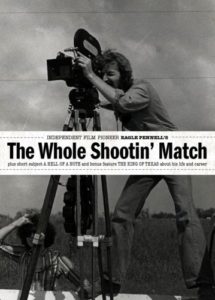 The films of Eagle Pennell have been my greatest recent discovery. Back in December, I stumbled across a VHS rip of Last Night at the Alamo, Pennell’s third film, which is set in a Houston dive bar on its final night in business before shutting down and being demolished to make way for high-rises. I was blown away. Pennell was an independent Texas filmmaker who only made a handful of pictures before dying eight days short of his fiftieth birthday, having become a hopeless drunk. The two films I’ve listed here are on MUBI as of a few days ago (they’ve also been available via Fandor for a while). A Hell of a Note (1977), Pennell’s first narrative short, is about some buddies who get fired from their jobs and end up at a bar. The Whole Shootin’ Match, co-written with Lin Sutherland and released in ’78, is Pennell’s debut feature. It’s about a couple of irrepressible loser pals in Austin who move from one get-rich-quick scheme to the next. The line you’ll most often see about The Whole Shootin’ Match is that it awoke Robert Redford to the possibilities of low-budget, independent, regional filmmaking when he saw it at the Park City Film Festival and even inspired him to start the Sundance Film Institute. Redford called it “a prime example of what we’re trying to do with independent filmmakers—quality stories out of the mainstream.” A Hell of a Note and The Whole Shootin’ Match both star Lou Perryman and Sonny Carl Davis, two genius screen presences. Both films are shot in black and white. Both are freewheeling and hilarious—hangout movies with dark streaks. Both do a great job of deconstructing a certain breed of American masculinity. Pennell was an avid Western fan (he changed the spelling in his last name to match that of Harry Carey, Jr.’s character in John Ford’s She Wore a Yellow Ribbon), and his films often reckon with the mythology of the West. It’s difficult to express how much I love these films, how much I’ve obsessed over them recently. Pennell feels like some wonderful mix of Sam Peckinpah, John Cassavetes, Charles Portis, Charles Bukowski, and Eugene O’Neill. He exerted a huge influence on early Richard Linklater, especially Slacker and Dazed and Confused. It’s worth noting that Watchmaker Films released both of these films in a DVD box set in 2009, which also includes a documentary about Pennell called The King of Texas. His work has been a true revelation to me.
The films of Eagle Pennell have been my greatest recent discovery. Back in December, I stumbled across a VHS rip of Last Night at the Alamo, Pennell’s third film, which is set in a Houston dive bar on its final night in business before shutting down and being demolished to make way for high-rises. I was blown away. Pennell was an independent Texas filmmaker who only made a handful of pictures before dying eight days short of his fiftieth birthday, having become a hopeless drunk. The two films I’ve listed here are on MUBI as of a few days ago (they’ve also been available via Fandor for a while). A Hell of a Note (1977), Pennell’s first narrative short, is about some buddies who get fired from their jobs and end up at a bar. The Whole Shootin’ Match, co-written with Lin Sutherland and released in ’78, is Pennell’s debut feature. It’s about a couple of irrepressible loser pals in Austin who move from one get-rich-quick scheme to the next. The line you’ll most often see about The Whole Shootin’ Match is that it awoke Robert Redford to the possibilities of low-budget, independent, regional filmmaking when he saw it at the Park City Film Festival and even inspired him to start the Sundance Film Institute. Redford called it “a prime example of what we’re trying to do with independent filmmakers—quality stories out of the mainstream.” A Hell of a Note and The Whole Shootin’ Match both star Lou Perryman and Sonny Carl Davis, two genius screen presences. Both films are shot in black and white. Both are freewheeling and hilarious—hangout movies with dark streaks. Both do a great job of deconstructing a certain breed of American masculinity. Pennell was an avid Western fan (he changed the spelling in his last name to match that of Harry Carey, Jr.’s character in John Ford’s She Wore a Yellow Ribbon), and his films often reckon with the mythology of the West. It’s difficult to express how much I love these films, how much I’ve obsessed over them recently. Pennell feels like some wonderful mix of Sam Peckinpah, John Cassavetes, Charles Portis, Charles Bukowski, and Eugene O’Neill. He exerted a huge influence on early Richard Linklater, especially Slacker and Dazed and Confused. It’s worth noting that Watchmaker Films released both of these films in a DVD box set in 2009, which also includes a documentary about Pennell called The King of Texas. His work has been a true revelation to me.
One False Move (Criterion Channel)
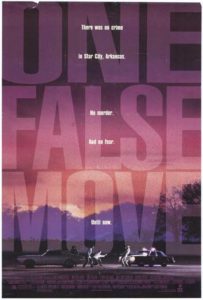 Carl Franklin’s One False Move appeared on the Criterion Channel last month as part of their Lovers on the Run collection. Released in 1992, it had a big impact on me as a kid and stands out as one of the greatest of all ’90s neo-noirs. Written by Billy Bob Thornton and Tom Epperson, the film stars Bill Paxton as Dale “Hurricane” Dixon, sheriff of a small Arkansas town called Star City, whose world brightens up when he finds out some crooks from Los Angeles are lamming it to his neck of the woods. Those crooks are Thornton’s Ray Malcolm, his girlfriend Fantasia (played by the enchanting Cynda Williams), and Michael Beach’s Pluto. They’ve left a body count behind them in L.A. and have skittered out of town with an ample haul of stolen loot and drugs. Both Ray and Fantasia have roots in Star City, and some L.A. cops team up with Hurricane in anticipation of heading them off. Tension and pressure take hold from the opening moments, and the film’s grip never loosens. Paxton gives his best performance, Thornton is creepy as hell, and you’ll wonder why Williams didn’t become a bigger star. In my mind One False Move is a perfect crime film, rooted as it is in desperate energy. It’s been largely unavailable for a long time, so seeing an HD transfer on the Criterion Channel is pretty damn exciting. Here’s to hoping for a great Blu-ray release soon.
Carl Franklin’s One False Move appeared on the Criterion Channel last month as part of their Lovers on the Run collection. Released in 1992, it had a big impact on me as a kid and stands out as one of the greatest of all ’90s neo-noirs. Written by Billy Bob Thornton and Tom Epperson, the film stars Bill Paxton as Dale “Hurricane” Dixon, sheriff of a small Arkansas town called Star City, whose world brightens up when he finds out some crooks from Los Angeles are lamming it to his neck of the woods. Those crooks are Thornton’s Ray Malcolm, his girlfriend Fantasia (played by the enchanting Cynda Williams), and Michael Beach’s Pluto. They’ve left a body count behind them in L.A. and have skittered out of town with an ample haul of stolen loot and drugs. Both Ray and Fantasia have roots in Star City, and some L.A. cops team up with Hurricane in anticipation of heading them off. Tension and pressure take hold from the opening moments, and the film’s grip never loosens. Paxton gives his best performance, Thornton is creepy as hell, and you’ll wonder why Williams didn’t become a bigger star. In my mind One False Move is a perfect crime film, rooted as it is in desperate energy. It’s been largely unavailable for a long time, so seeing an HD transfer on the Criterion Channel is pretty damn exciting. Here’s to hoping for a great Blu-ray release soon.
Nomadland (Hulu)
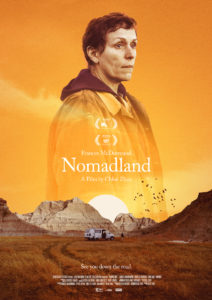 I’ve been anxiously waiting for this one since last year and then briefly lost interest when it finally dropped on Hulu, after reading a review that made me wary. I loved Chloé Zhao’s The Rider, but Nomadland is getting the kind of awards hype that often leaves me cold and there’s been some blowback from critics I trust. After watching the film, I can say that the negative review I read was mean-spirited and wrongheaded. I’d read a couple of other things too that had made me doubtful—one criticizing how it utilized non-actors. In any case, those writers missed the mark. Among other things, Nomadland is a truly great Western about searching and wandering and making meaning in life. It’s subtle and quiet, with so much left under the surface. Given the nature of the story—Frances McDormand’s Fern, having lost everything, lives as a modern-day nomad—it could’ve felt slow in a way that alienated wider audiences, but it’s paced really well and never drags in an overdone, misguided way. McDormand is wonderful, of course, and so is David Strathairn. And I loved the score by Ludovico Einaudi, which I’ve also seen people taking jabs at.
I’ve been anxiously waiting for this one since last year and then briefly lost interest when it finally dropped on Hulu, after reading a review that made me wary. I loved Chloé Zhao’s The Rider, but Nomadland is getting the kind of awards hype that often leaves me cold and there’s been some blowback from critics I trust. After watching the film, I can say that the negative review I read was mean-spirited and wrongheaded. I’d read a couple of other things too that had made me doubtful—one criticizing how it utilized non-actors. In any case, those writers missed the mark. Among other things, Nomadland is a truly great Western about searching and wandering and making meaning in life. It’s subtle and quiet, with so much left under the surface. Given the nature of the story—Frances McDormand’s Fern, having lost everything, lives as a modern-day nomad—it could’ve felt slow in a way that alienated wider audiences, but it’s paced really well and never drags in an overdone, misguided way. McDormand is wonderful, of course, and so is David Strathairn. And I loved the score by Ludovico Einaudi, which I’ve also seen people taking jabs at.
Cairo Station (Netflix)
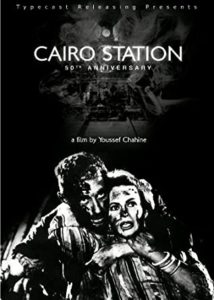 Netflix is not known for having a great selection of classic films, but it does have a fairly extensive world cinema library. Youssef Chahine’s Cairo Station from 1958 is one I lucked across, drawn in by the title and the sepia thumbnail image of lead actress Hend Rostom (known as “the Marilyn Monroe of the Middle East”). It’s a true buried gem. Chahine was a well-regarded Egyptian director with a long, distinguished career, but this was my introduction to his work (and it turns out Netflix has a whole bunch of his films). The plot revolves around a peddler who makes his living selling newspapers in the central Cairo train station and becomes obsessed with a young woman who sells drinks there. It’s neorealism mixed with lurid noir melodrama. A psychosexual thriller. Feels like it could’ve been written by Patricia Highsmith or Paul Schrader (and, almost certainly, must have had some influence on Schrader). A tense and economical seventy-three minutes. I liked it so much I chose it as my first pick in the pandemic movie club I’m in with some writer pals.
Netflix is not known for having a great selection of classic films, but it does have a fairly extensive world cinema library. Youssef Chahine’s Cairo Station from 1958 is one I lucked across, drawn in by the title and the sepia thumbnail image of lead actress Hend Rostom (known as “the Marilyn Monroe of the Middle East”). It’s a true buried gem. Chahine was a well-regarded Egyptian director with a long, distinguished career, but this was my introduction to his work (and it turns out Netflix has a whole bunch of his films). The plot revolves around a peddler who makes his living selling newspapers in the central Cairo train station and becomes obsessed with a young woman who sells drinks there. It’s neorealism mixed with lurid noir melodrama. A psychosexual thriller. Feels like it could’ve been written by Patricia Highsmith or Paul Schrader (and, almost certainly, must have had some influence on Schrader). A tense and economical seventy-three minutes. I liked it so much I chose it as my first pick in the pandemic movie club I’m in with some writer pals.
Saint Maud (EPIX)
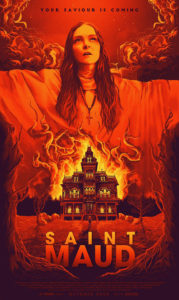 I’d been dying to see this for a year at least, and it far exceeded expectations. An incredible first film from Rose Glass. Slow-burn psychological Catholic horror. Riffs on William Blake and Joan of Arc and the wildest and most deranged of the mystics. Reminded me of Neil Jordan’s The Butcher Boy in some ways. I also thought of Michael Tolkin’s The Rapture, especially tone-wise. Evocative moments, scenes, details. So upsetting and familiar. Maud’s inner world is laid bare. Prayer as psychosis. Religion as euphoric sickness. A meditation on lostness and loneliness and death. Tragic and darkly funny in parts. Loaded with body horror. Morfydd Clark is a shapeshifter—lovely and sad and tender and scary, a sick saint one minute, a shivering demon the next. Those eyes! Jennifer Ehle also gives a wonderful performance as bohemian Amanda, Maud’s dying charge. If you’re Catholic-haunted like me, this will get way under your skin.
I’d been dying to see this for a year at least, and it far exceeded expectations. An incredible first film from Rose Glass. Slow-burn psychological Catholic horror. Riffs on William Blake and Joan of Arc and the wildest and most deranged of the mystics. Reminded me of Neil Jordan’s The Butcher Boy in some ways. I also thought of Michael Tolkin’s The Rapture, especially tone-wise. Evocative moments, scenes, details. So upsetting and familiar. Maud’s inner world is laid bare. Prayer as psychosis. Religion as euphoric sickness. A meditation on lostness and loneliness and death. Tragic and darkly funny in parts. Loaded with body horror. Morfydd Clark is a shapeshifter—lovely and sad and tender and scary, a sick saint one minute, a shivering demon the next. Those eyes! Jennifer Ehle also gives a wonderful performance as bohemian Amanda, Maud’s dying charge. If you’re Catholic-haunted like me, this will get way under your skin.
The Bonnie Parker Story (Prime, Tubi, YouTube)
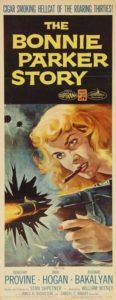 A mean, sleazy, economical B crime picture from American International with a knockout lead performance by Dorothy Provine. Feels dangerous as hell. Released in ’58 and set in the early ’30s, it has the energy of a pre-Code with its lack of a moral compass and a few borderline steamy scenes. A memorable rock and roll soundtrack makes it feel like a rockabilly lovers on the run movie. Not sure how/why Bonnie Parker stayed Bonnie Parker and Clyde Barrow became Guy Darrow (reminded me of Bukowski calling Jack Kerouac Mack Derouac), but this only really uses the bones of the legend to build a kind of unhinged punk ballad. Thank goodness the focus is all on Bonnie because Provine flat out smolders every time she’s on screen. Great cinematography by Jack Marta. Director William Witney had a wild and varied career that stretched from serials and Roy Rogers movies in the ’30s and ’40s to exploitation fare in the ’70s and one final Western in the early ’80s. This was my second pick for our pandemic movie club.
A mean, sleazy, economical B crime picture from American International with a knockout lead performance by Dorothy Provine. Feels dangerous as hell. Released in ’58 and set in the early ’30s, it has the energy of a pre-Code with its lack of a moral compass and a few borderline steamy scenes. A memorable rock and roll soundtrack makes it feel like a rockabilly lovers on the run movie. Not sure how/why Bonnie Parker stayed Bonnie Parker and Clyde Barrow became Guy Darrow (reminded me of Bukowski calling Jack Kerouac Mack Derouac), but this only really uses the bones of the legend to build a kind of unhinged punk ballad. Thank goodness the focus is all on Bonnie because Provine flat out smolders every time she’s on screen. Great cinematography by Jack Marta. Director William Witney had a wild and varied career that stretched from serials and Roy Rogers movies in the ’30s and ’40s to exploitation fare in the ’70s and one final Western in the early ’80s. This was my second pick for our pandemic movie club.
William Boyle is the author of the novels Gravesend, The Lonely Witness, A Friend Is a Gift You Give Yourself, and City of Margins, and a story collection, Death Don’t Have No Mercy. His novella Everything Is Broken was published in Southwest Review Volume 104, numbers 1–4. His writing on film has appeared in Oxford American and CrimeReads. He used to have a blog about ’70s crime films called Goodbye Like a Bullet. His website is williammichaelboyle.com.
More Movies


